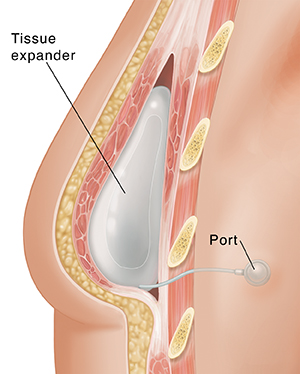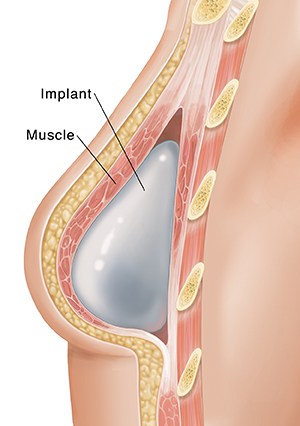Breast Reconstruction with Implants
Deciding on breast reconstruction
There are many choices for breast reconstruction after having surgery to remove a breast (mastectomy). Your surgeon can help you decide whether you're able to have reconstructive surgery and what kind is best for you. You may need to wait if now isn't the best time for you. For instance, you may be advised to wait if you need radiation treatments after surgery. Breast reconstruction can be done months or even years after mastectomy.
Delayed breast reconstruction
For this choice, the breast area is prepared for a breast implant with a tissue expander. This is an empty implant shell that's put in during the mastectomy. You'll be given time to heal and recover from surgery. When you're ready, the tissue expander is slowly filled with fluid or air over several weeks. This is done to gently stretch the skin and muscle to make room for the implant. If needed, you might have chemotherapy during this time.
When the muscle and skin are stretched enough, a surgeon can replace the expander with a permanent implant. If you're having radiation therapy, the final implant will be put in after that treatment is completed.
 |
| A tissue expander stretches the muscle and skin to make room for an implant. |
Immediate breast reconstruction
This is a choice if you aren't having radiation therapy after surgery. The surgeon will place the implant at the same time they perform the mastectomy. Sometimes more surgery is needed to get the final shape and look.
Placing the implant
Most breast implants are shells filled with fluid (saline) or thick, gummy gel (silicone). The implant is placed under your chest muscle. Sometimes an acellular dermal matrix is used like a sling to hold it in place. Recovery may take up to 6 weeks. It may take many months before the bruising and swelling go away and you can see the final results.
Sometimes more surgery is needed to complete the reconstruction. For instance, you might want a nipple and areola created. Surgery may also be needed to match your remaining breast to the reconstructed one. Expect the reconstructed breast to be firmer than your normal breast. Implants don't last forever and will need to be replaced at some point in the future.
 |
| Breast implants are placed under the chest muscle. |
Risks of breast implant
Any type of surgery has some risk. Some problems related to breast reconstruction with implants include:
-
Bleeding
-
Infection
-
Fluid collection in the surgical area (seroma)
-
Problems with the medicines (anesthesia) used to do the surgery
-
Bruising and swelling
-
Trouble healing
-
Implant problems, such as leaking, breaking, or coming through the skin
-
Implant rejection
-
Breast implant-linked anaplastic large cell lymphoma. a rare type of T-cell lymphoma cancer
-
Scar tissue which can cause the breast to feel painful, hard, and cold to the touch
The most common problem of breast reconstruction done with implants is called capsular contracture . This is when the scar or capsule around the implant begins to tighten and become hard. In some cases, this and other problems are bad enough to need another surgery.
Women who smoke are at higher risk for problems after surgery. These include slow healing, more noticeable scars, and taking longer to recover. Talk with your healthcare provider and get help quitting before surgery.
Also keep in mind that you may not be happy with the final outcome.
Implant maintenance
Ask your surgeon how long your implants should last. Also ask what signs of a problem you should watch for and when to seek help. The FDA recommends that women with silicone implants get routine MRI screenings to check for signs that an implant is leaking or broken.
Work with your healthcare team
Talk with your healthcare provider about the pros and cons of each type of breast reconstruction surgery. Also talk about your implant choices. There are many different kinds available in different sizes, textures, and shapes. Be sure you know what to expect your breasts will look and feel like after surgery. Learn as much as you can before deciding what's best for you.